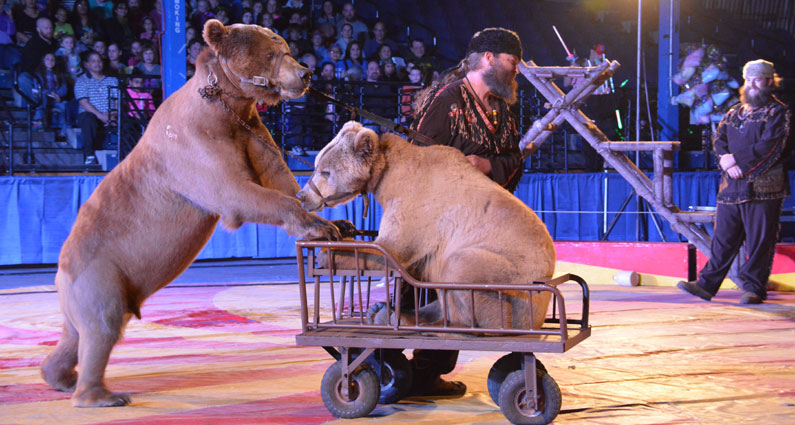April 19, 2017 | News Releases
For Immediate Release: April 19, 2017
(Tallahassee, FL) — In today’s Tallahassee Democrat, the Animal Rights Foundation of Florida (ARFF) is running an advertisement urging Governor Rick Scott to appoint a nature photographer, a birdwatcher, or an individual with a background in wildlife conservation, to fill the next vacancy on the Florida Fish and Wildlife Conservation Commission (FWC).
Today’s ad also ran in Sunday and Monday’s papers, and will run on Thursday as well, the final day of an FWC meeting in the town of Havana, north of Tallahassee.
View the ad here: www.download.arff.org/FWC-advertisement.pdf
The ad features an image of a black bear under the headline, “Florida’s wildlife belongs to all Floridians”. At this week’s meeting, the FWC will once again discuss bear management. In 2015, the FWC approved a black bear hunt despite strong public opposition. It was the first bear hunting season in Florida in 21 years.
“It is time that the FWC has a Commissioner who represents nature photographers, birders, hikers and other ‘non-consumptive’ users of Florida’s fish and wildlife,” said Don Anthony, ARFF’s Communications Director. “Most residents of Florida are not hunters, yet the FWC has long been dominated by individuals with a hunting background.”
Nature photography, along with birdwatching, hiking, canoeing and kayaking are the fastest-growing outdoor activities in America. According to the FWC’s own numbers, “wildlife viewing” has a much greater economic impact in Florida than hunting. The appointment of a photographer, birder, or wildlife advocate would add an important perspective to the Florida Fish and Wildlife Conservation Commission.
# # #
March 24, 2017 | News & Information

On hundreds of occasions over many years, Philip Lloyd and his company BioChemed Services exported blood products of monkeys* and other animals to biotech companies around the world, but fraudulently labeled the packages as containing human blood to avoid the attention of government inspectors. His actions made him a lot of money, but in the words of prosecutors, posed “a significant public health threat” and “risked the safety of the world’s supply of human blood” (monkeys can carry viruses and diseases that can be transmitted to humans).
In November 2016, Lloyd pleaded guilty to “conspiracy to mislabel wildlife products intended for foreign commerce.” Last week, in U.S. district court in Virginia, he was sentenced to 4 months in jail and a $250,000 fine.
Prior to sentencing, the judge received a letter seeking leniency for Lloyd from Michael Disbrow, who described Lloyd as a friend. Disbrow is senior director of “Nonhuman Primate Operations” for PreLabs, a company that operates a monkey quarantine/research facility in Hendry County. Disbrow and Lloyd are also partners in a Florida corporation called Flava Partners, LLC.
It is shocking that an executive of a research organization in Florida apparently has no qualms about being business partners with an individual who so flagrantly broke laws designed to protect human health.
*BioChemed has purchased blood from Florida’s Primate Products and other corporations that import and breed monkeys for use in research and testing
February 6, 2017 | News & Information
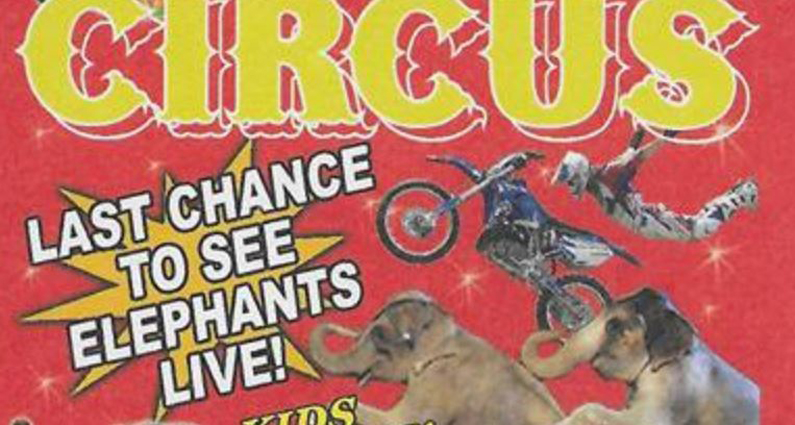
When the Ringling Bros. and Barnum & Bailey Circus took its elephants off the road in May 2016, animal advocates cheered. Other Florida-based circuses saw the move as a marketing opportunity.
The Garden Bros. Circus advertised its 2016 tour as, “Last chance to see elephants live!” Apparently, the gimmick worked because they are using the tagline again this year.
On ticket coupons, Circus Pages teases, “May be the last chance to see performing elephants!”
Another Florida circus, the Stardust Circus, is using a similar line this year in its advertisements, “Come see one of the last performing circus elephants.”
We don’t believe any of these circuses will stop elephant acts, unless they have to. The end of elephants in the circus will come about due to the passage of local ordinances and state laws restricting the use of wild animals in the circus, and because the public– increasingly aware of the suffering of animals in traveling circuses– refuses to purchase tickets to circuses featuring animal acts.
January 13, 2017 | News & Information
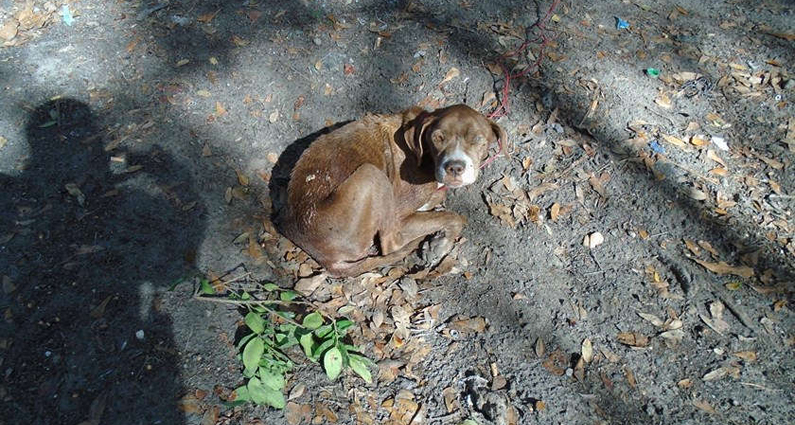
In May 2016, the Hernando County Commission approved a strong anti-tethering ordinance that prohibits the unsupervised, unattended outdoor chaining of dogs. Last week the ordinance helped to save the lives of several dogs. On January 4, an animal control officer spotted dogs, including the malnourished dog in the above photo, tied to a tree at a home in Garden Grove, in violation of the county ordinance. The officer investigated and discovered numerous dogs suffering without food or water or proper shelter. In total, 11 dogs were seized and transported to Hernando County Animal Services for medical care. Three people living at the home were arrested and charged with animal cruelty.
A growing number of cities and counties in Florida have enacted ordinances banning or restricting the cruel tethering/chaining of dogs, including Broward, Collier, Escambia, Hillsborough, Manatee, Marion, Miami-Dade, Okaloosa, Orange, Palm Beach, Pasco, Pinellas, St. Lucie, Sarasota and Seminole Counties.
You Can Help
If your city or county does not have an ordinance addressing the cruel chaining of dogs, contact your local elected officials and urge them to consider adding this important protection for dogs. Contact ARFF for help!
January 2, 2017 | News & Information
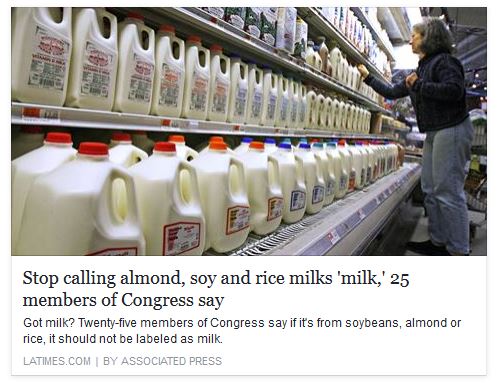 Congressman Tom Rooney, representing Florida’s 17th congressional district, is unhappy about the popularity of healthy, plant-based milks. Rooney was the only member of Congress from Florida to sign a recent letter to the U.S. Food and Drug Administration asking it to do something to stop milk from soybeans, almonds or rice from being sold as “milk.”
Congressman Tom Rooney, representing Florida’s 17th congressional district, is unhappy about the popularity of healthy, plant-based milks. Rooney was the only member of Congress from Florida to sign a recent letter to the U.S. Food and Drug Administration asking it to do something to stop milk from soybeans, almonds or rice from being sold as “milk.”
The letter complains that “dairy farmers are facing a serious financial crisis,” while at the same time “there has been tremendous growth in the sale of plant-based” milks.
It’s a silly argument. A growing number of Floridians will enjoy liquid taken from beans, nuts and seeds regardless if it’s called “milk” or “drink” or something else. And consumers who are concerned about animal welfare, the environment or their own health will continue to reject dairy. Visit ARFF’s website to learn more about the dairy industry.
October 5, 2016 | News & Information
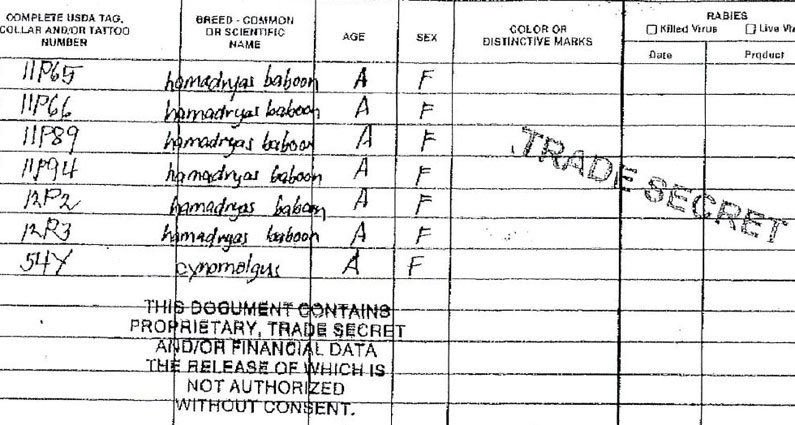
The Oregon Health & Science University (Portland, OR) has again purchased monkeys from Worldwide Primates, a Miami-based laboratory animal supplier with a horrible history.
In response to a public records request, ARFF has received copies of paperwork filed by Worldwide Primates with the Oregon Department of Agriculture detailing a shipment of 12 baboons and four crab-eating macaques from Florida to Oregon.
A similar shipment of 27 monkeys in September 2015 was the subject of an article by InvestigateWest (the article also highlighted Oregon’s public records exemption for information about animal research at OHSU).
Miami-based Worldwide Primates is one of the country’s largest importers of monkeys for use in experimentation. The company is run by Matt Block, who was sent to prison in the 1990s after being convicted of smuggling endangered wildlife (baby orangutans) in the infamous “Bangkok Six” case.
You Can Help
Ask OHSU to reconsider doing business with Worldwide Primates. Contact:
Oregon Health & Science University
Online comment form (bottom of page)
August 20, 2016 | News & Information
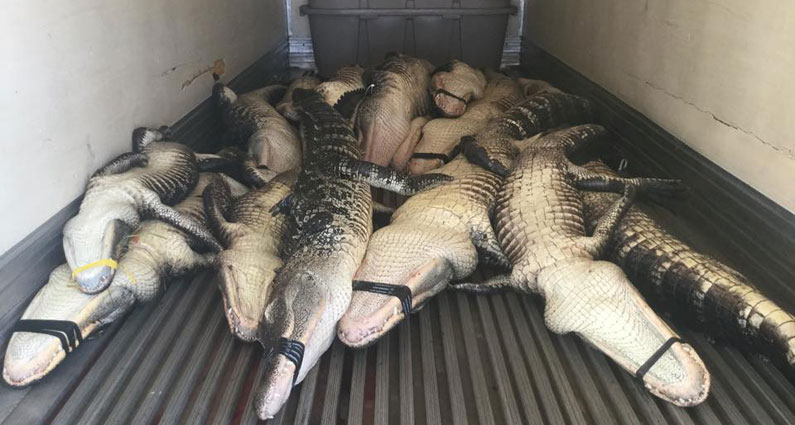
In 1967 the American alligator received federal protection as an endangered species, after decades of commercial hunting decimated alligator populations. 50 years later, alligator numbers have recovered, but the hunting of alligators for profit is going strong once again.
The 2016 Florida alligator hunt began this week. Processors were waiting at the docks for hunter’s boats to return, ready to purchase the skin and flesh of dead alligators. The Florida Fish & Wildlife Conservation Commission encourages the trade by providing hunters with a list of alligator meat processors and hide dealers (photo: dead alligators awaiting “processing”).
It is illegal for hunters in Florida to sell the meat, skin or feathers of game animals. The alligator is the only exception.
There should not be a “price per foot” for Florida’s wildlife. It’s time to end the commercialization of our wildlife.
July 6, 2016 | News & Information
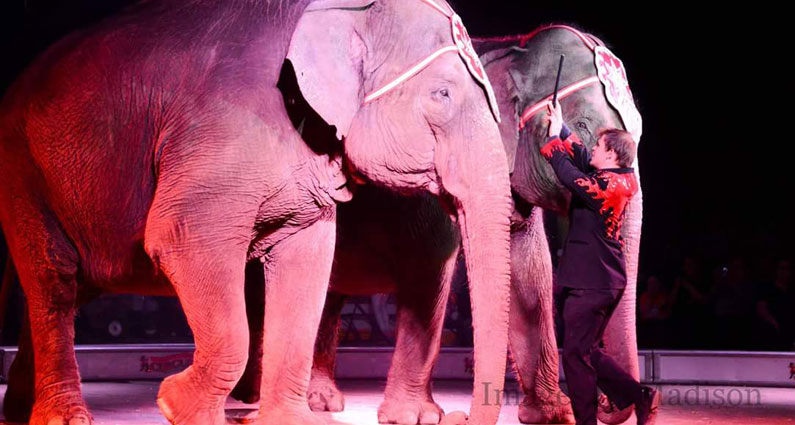
This week the Garden Bros. Circus began three weeks of shows in Florida. The circus is traveling with elephants and camels. Garden Bros. is a new circus, founded in 2015 by Niles Garden. The Garden family has a history of criminal charges, animal cruelty citations, lawsuits and customer complaints dating back three decades. Read more about the troubled history of Garden family circuses here.
A now defunct circus managed by Niles Garden, the Sterling & Reid Bros. Circus, had a sordid record. In 2002, a handler with the circus was arrested in Virginia for beating an elephant bloody during a performance. In 2001, a bear fell out of a circus truck onto a highway in Louisiana and wasn’t discovered missing until 1/2 hour later. In 2001, the Sarasota Herald-Tribune reported, “The [U.S. Department of Agriculture] has issued more than 30 pages of violations to Sterling & Reid since 1999. And it fined the circus $3,250….”
You Can Help
Join protests against the Garden Bros. Circus in Cocoa (July 6-7) Punta Gorda (July 13) and West Palm Beach (July 23). Additional protests to be scheduled.
June 17, 2016 | News & Information
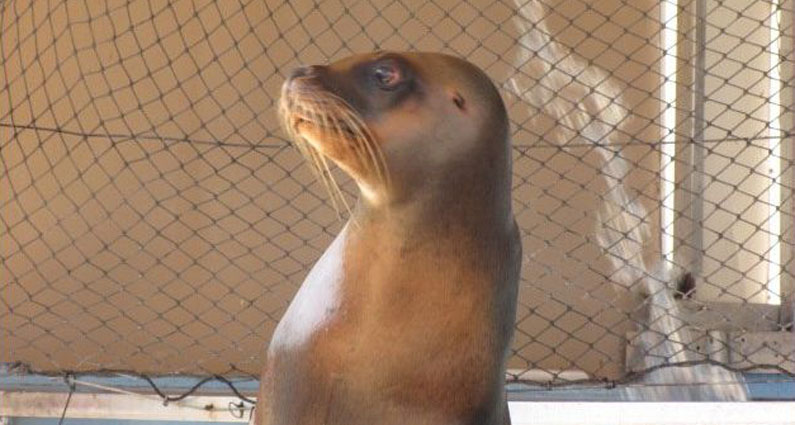
An animal act called Sea Lion Splash is a frequent performer at county fairs in Florida. During a May 17 inspection at a fair in South Carolina, the U.S. Department of Agriculture found numerous serious violations of the federal Animal Welfare Act (AWA):
- Five sea lions were confined in a pool that did not meet the AWA’s minimum size requirements. The traveling exhibit also failed to provide the animals with adequate protection from direct sun.
- Three of the five sea lions were found to be suffering from serious, painful eye conditions. The USDA inspector noted that water in the sea lion’s pool was not being tested, and chlorine levels and lack of salinity in the pool was contributing to the eye problems. According to the inspection report, “The attending veterinarian has prescribed all of the sea lions have easy access to salt water. This is not being done.” The USDA inspector also noted that medical records show that one of the sea lions had similar eye problems in June 2015, indicating “recurrent, chronic eye problems which are not being adequately addressed and treated properly.”
- The USDA inspector called into question the qualifications of the two trainers. The inspector reported that the head trainer “does not appear to have adequate training and knowledge to be the primary caretaker for these animals;” also, “The caretaker does not have a copy of the USDA regulations and has not read them.”
The following fairs featured Sea Lion Splash in early 2016. Please contact the fairs and ask them to reconsider including Sea Lion Splash in future fairs.
Daniel West, Manager
Manatee County Fair
Email: dwest@manateecountyfair.com
Jay Spicer, Manager
Martin County Fair Association
Email: fairoffice@martincountyfair.com
Rory Martin, President
Sarasota Agricultural Fair
Email: info@sarasotafair.com
Steven Shechtman, President
Santa’s Enchanted Forest
Online comment form.
Thank you.
June 2, 2016 | News & Information
When a USDA inspector stopped by the Aleppo Shriners Circus in Wilmington, Massachusetts on April 22, she found that the main source of food for two adult brown bears was “a large amount of bread.” The bears, owned by Florida-based Rosaire’s Bears, perform a depressing circus act muzzled and chained (see below photo).
The inspector noted that bread does not meet the nutritional requirements of adult brown bears. To correct the violation, the bear’s owner made a quick trip to the grocery store. The inspector wrote in her report, “The licensee corrected this item at the time of inspection by going to store and bringing back a large amount of fresh fruits and vegetables.”
It is common for animals in traveling circuses to suffer from poor nutrition. The food that bears, tigers and other animals receive is often based on economic rather than nutritional requirements.
